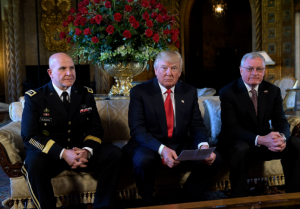President Donald Trump has tapped Army Lt. Gen. H.R. McMaster as his new national security adviser, replacing the ousted Michael Flynn.
“He’s a man of tremendous talent and tremendous experience,” Trump said on Monday, according to a White House press pool report. “I watched and read a lot over the last two days. He is highly respected by everyone in the military and we’re very honored to have him.”
Trump says retired Army Lt. Gen. Keith Kellogg who had been his acting adviser, will now serve as the National Security Council’s chief of staff. He also said he would be asking John Bolton, a former U.S. ambassador to the United Nations, to work with them in a “somewhat different capacity.”
Trump made the announcement from a luxurious living room, sitting on a couch between McMaster and Kellogg. He has been looking for a replacement for retired Lt. Gen. Michael Flynn, who was ousted last week.
Trump brought four options for the position to Mar-a-Lago over the weekend for in person interviews, McMaster among them. On Monday, Trump told reporters that Vice President Michael Pence played a role in selecting McMaster for the job.
“I would just like to say what a privilege it is to be able to continue serving our nation,” McMaster said on Monday, according to the pool report. “I’m grateful to you for that opportunity, and I look forward to joining the national security team and doing everything that I can to advance and protect the interests of the American people. Thank you very much.”
The position of national security adviser does not require Senate confirmation.
Trump pushed out Flynn a week ago after revelations that the adviser had misled Pence about discussing sanctions with Russia’s ambassador to the U.S. during the presidential transition. Trump said in a news conference Thursday that he was disappointed by how Flynn had treated Pence, but did not believe Flynn had done anything wrong by having the conversations.
Trump’s first choice to replace Flynn, retired Vice Adm. Robert Harward, turned down the offer.
McMaster is widely praised as a strategic thinker who is not afraid to speak truth to power. His 1997 book “Dereliction of Duty” criticized the Joint Chiefs of Staff for not doing more during the Vietnam War to oppose decisions by President Lyndon Johnson and Defense Secretary Robert McNamara that were doomed to fail, costing the lives of U.S. troops.
He wrote that Army Chief of Staff Gen. Harold Johnson justified his acquiescence after the war by saying: “What should my role have been? I am a dumb soldier under civilian control … I could resign, and what am I? I am a disgruntled general for 48 hours and then I’m out of sight. Right?”
As a commander, McMaster bucked conventional wisdom. In 2005, he had his troops live among the Iraqis in Tal Afar at a time when the U.S. was consolidating its troop presence in Iraq onto a handful of huge bases. The move worked and became adopted as part of the Army and Marine Corps’ counterinsurgency strategy.
In more recent years, McMaster has been outspoken in his criticism of budget cuts foisted on the Army and other services following disagreements between Republicans and former President Obama on taxes and spending. In April, he told lawmakers that the Army was being forced to cut spending on modernization so that it could keep soldiers battle ready.
“These land forces have to have mobility, they have to have protection, they have to have lethality,” McMaster said at an April 5 hearing. “A lot of times you’ll hear the term ‘light and nimble.’ Well, Richard Simmons is light and nimble, and we don’t send him to go do harm to somebody.”
McMaster’s frankness has not always helped his career. He was initially overlooked for promotion to brigadier general and could well have ended his career as an Army colonel — but when his mentor Army Gen. David Petraeus became head of a 2008 brigadier general promotion board, McMaster finally received his first star.
“I was privileged to have him serve in key positions during the surges in Iraq and Afghanistan, and he will be a tremendous National Security Adviser,” Petraeus told Military Times on Monday.
National security experts on both sides of the aisle praised McMaster’s selection as Trump’s new national security adviser.
“McMaster is an absolutely brilliant choice,” said Michael O’Hanlon, of the left-leaning Brookings Institution think tank. “Quite possibly the single most talented three-star [general] in the U.S. military today. He is accomplished across wide domains of military operations as well as integrated political-military challenges like counterinsurgency warfare in general, and fighting corruption in Afghanistan in particular. He is affable and charming but not afraid to challenge and provoke. Yet in the end, he has great judgment. For whatever reason, Trump continues to choose great people in his national security team. Whether the chemistry between the president and his adviser will be good, I can’t say — I only know one of the two gentlemen. But H.R. is a force of nature and a national treasure — and a very likeable person.”
Likewise, Sen. John McCain, R-Ariz., called McMaster “an outstanding choice” to be the next national security adviser.
“I have had the honor of knowing him for many years, and he is a man of genuine intellect, character, and ability,” McCain said in a statement on Monday. “He knows how to succeed. I give President Trump great credit for this decision, as well as his national security cabinet choices. I could not imagine a better, more capable national security team than the one we have right now.”
It was a sentiment shared by Rep. Devin Nunes, R-Calif., chairman of the House Permanent Select Committee on Intelligence.
“I congratulate Lt. Gen. McMaster on his appointment as National Security Adviser,” Nunes said in a statement on Sunday. “With his history of questioning the status quo and infusing fresh thinking and new approaches into military affairs, Lt. Gen. McMaster will make a fine addition to the Trump Administration’s national security team.”
Ask me anything
Explore related questions






